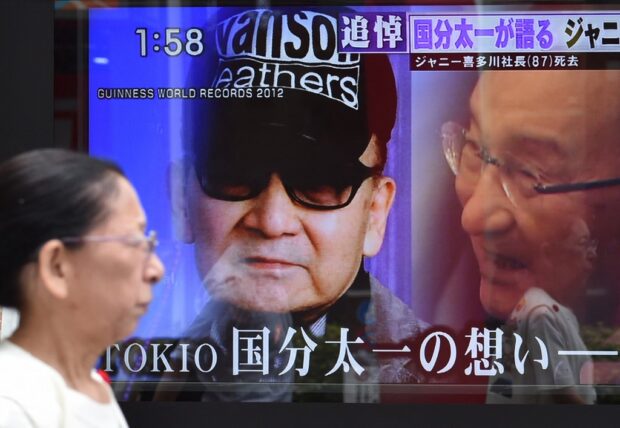Alleged sex victims of Japan pop mogul dies after online abuse — reports

A woman walks past a roadside television screen reporting the death of Johnny Kitagawa, founder of Japanese talent agency Johnny & Associates Inc., in Tokyo on July 10, 2019. The president of Japan’s biggest boyband agency, Julie Fujishima, admitted for the first time on Thursday, Sept. 7, 2023, that the agency’s late founder sexually abused young aspiring stars, as she announced her resignation. KAZUHIRO NOGI / AFP
TOKYO — A man who had said he was sexually abused by the founder of Japan’s top boyband agency has died after receiving a torrent of online harassment, local media reported Tuesday.
The man in his 40s, who had belonged to a group of alleged victims, was found dead in an apparent suicide last month in western Osaka prefecture, public broadcaster NHK said, citing police sources. The man was not named.
The Yomiuri daily reported that the man had received disparaging comments on social media, such as “Your lie will be exposed” and “You want money”, after he went public with accusations of sexual abuse by Johnny Kitagawa, the founder of boyband empire Johnny & Associates.
The agency admitted in September that Kitagawa, who died aged 87 in 2019, had sexually assaulted teenage boys and young men seeking stardom over decades.
Prior to the man’s death, three members of the group of alleged victims had filed reports to police about being harassed online after they told media about the alleged sexual abuse.
The deceased man had “asked the boyband agency to take action against abuse, but they only called on people to stop it without taking concrete measures”, his family said in a statement, according to NHK and other local media.
“His emotional distress became even more severe as it was compounded by the recurrence of the sexual trauma he had originally suffered,” the family said, adding that he had reported the sexual abuse to the agency in May but had not heard back from a company representative other than receiving a promise to reply.
The family was “still in disbelief and stunned by his sudden departure”, they added.
Johnny & Associates announced last month that it would be renamed “Smile-Up” and dedicated solely to redressing survivors of Kitagawa’s abuse, before being shuttered and transferring its talent to a new management company.
Allegations that Kitagawa abused young men who wanted to be stars surfaced in Japanese media in 1999.
But it was not until this year that they ignited full-on soul-searching, following a BBC documentary and denunciations by victims.